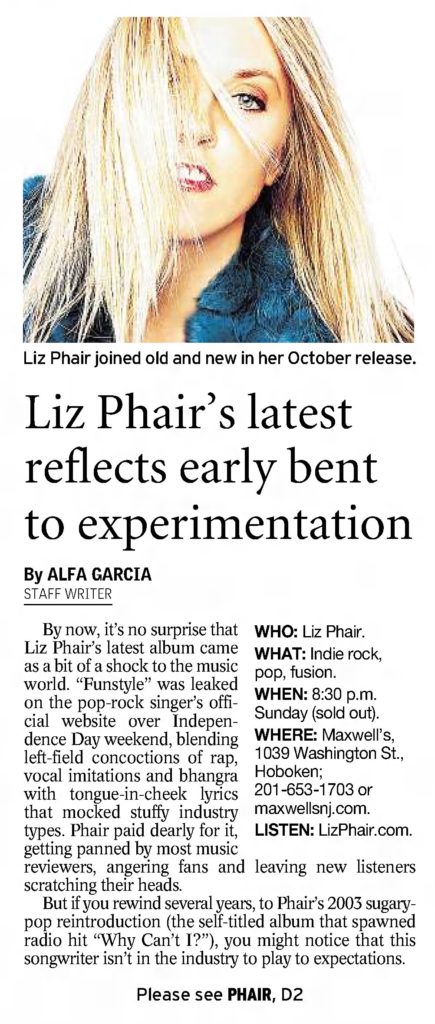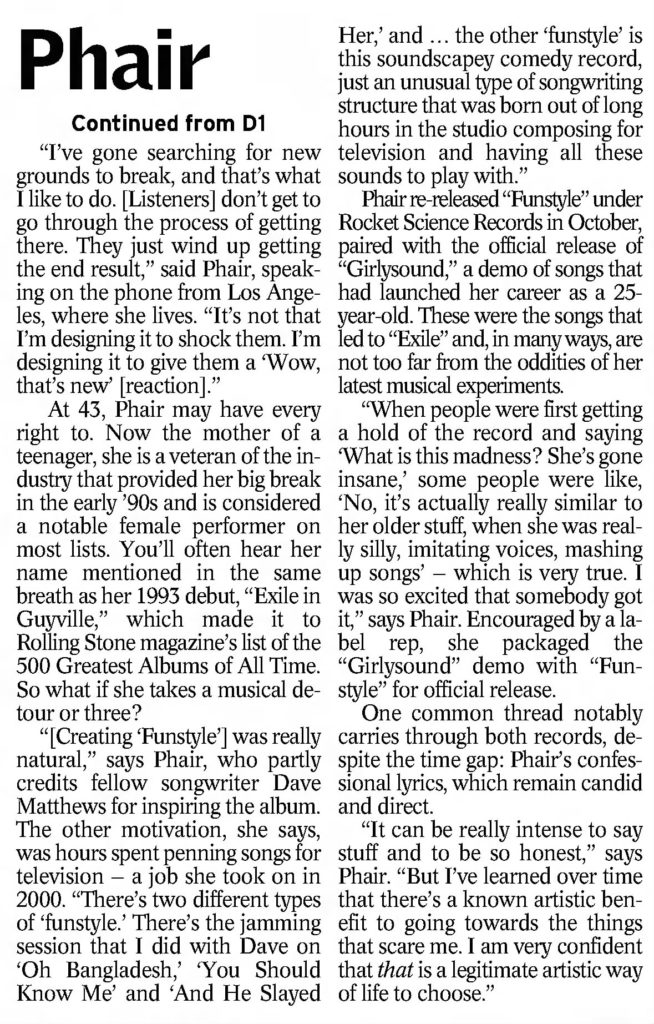By Alfa Garcia
The Herald-News (Passaic, New Jersey), December 9, 2010
By now, it’s no surprise that Liz Phair’s latest album came as a bit of a shock to the music world. “Funstyle” was leaked on the pop-rock singer’s official website over Independence Day weekend, blending left-field concoctions of rap, vocal imitations and bhangra with tongue-in-cheek lyrics that mocked stuffy industry types. Phair paid dearly for it, getting panned by most music reviewers, angering fans and leaving new listeners scratching their heads.
But if you rewind several years, to Phair’s 2003 sugary-pop reintroduction (the self-titled album that spawned radio hit “Why Can’t I?”), you might notice that this songwriter isn’t in the industry to play to expectations.
“I’ve gone searching for new grounds to break, and that’s what I like to do. [Listeners] don’t get to go through the process of getting there. They just wind up getting the end result,” said Phair, speaking on the phone from Los Angeles, where she lives. “It’s not that I’m designing it to shock them. I’m designing it give them a ‘Wow, that’s new’ [reaction].”
At 43, Phair may have every right to. Now the mother of a teenager, she is a veteran of the industry that provided her big break in the early ’90s and is considered a notable female performer on most lists. You’ll often hear her name mentioned in the same breath as her 1993 debut, “Exile in Guyville,” which made it to Rolling Stone magazine’s list of the 500 Greatest Albums of All Time. So what if she takes a music detour or three?
“[Creating] ‘Funstyle’ was really natural, ” says Phair, who partly credits fellow songwriter Dave Matthews for inspiring the album. The other motivation, she says, was hours spent penning songs for television — a job she took on in 2000. “There’s two different types of ‘funstyle.’ There’s the jamming session that I did with Dave on ‘Oh Bangladesh,’ ‘You Should Know Me’ and ‘And He Slayed Her,’ and… the other ‘funstyle’ is this soundscapey comedy record, just an unusual type of songwriting structure that was born out of long hours in the studio composing for television and having all these sounds to play with.”
Phair re-released “Funstyle” under Rocket Science Records in October, paired with the official release of “Girlysound,” a demo of songs that had launched her career as a 25-year-old. These were the songs that led to “Exile” and, in many ways, are not too far from the oddities of her latest musical experiments.
“When people were first getting a hold of the record and saying ‘What is this madness? She’s gone insane,’ some people were like, ‘No, it’s actually really similar to her older stuff, when she was really silly, imitating voices, mashing up songs,’ — which is very true. I was so excited that somebody got it,” says Phair. Encouraged by a label rep, she packaged the “Girlysound” demo with “Funstyle” for official release.
One common thread notably carries through both records, despite the time hap: Phair’s confessional lyrics, which remain candid and direct.
“It can be really intense to say stuff and to be so honest,” says Phair. “But I’ve learned over time that there’s a known artistic benefit to going towards the things that scare me. I am very confident that that is a legitimate artistic way of life to choose.”











